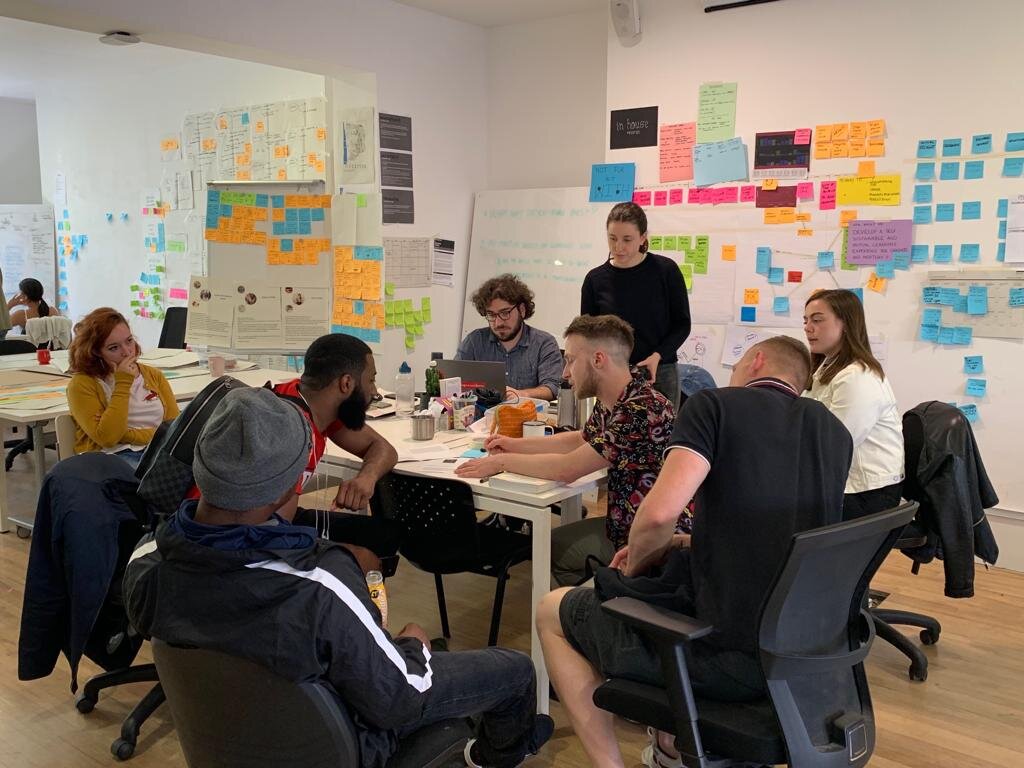InHarmony, a co-creative advocacy programme provided by InHouse Records for it’s Graduates.
InHouse is a unique record label, run by prisoners within 6 prisons. It is backed by Universal Music, Island Records, Fender, Roland, Abbey Road Studios, EY and the Ministry of Justice. It is a fully functioning music label with roles spanning sound engineers to A&R, and enables prisoners to repurpose as well as learn new skills that they can use on release. Their mission is to reduce violence in prisons, improve overall behaviour and dramatically reduce re-offending rates through the power of music.
Extending InHouse records’ intervention “beyond the gate”
Upon release, InHouse users who have completed the programme gain InHouse Graduate status, certified by EY. Currently, InHouse does a great job of reaching out to the most marginalised and often distributive prisoners, as well as those passionate about music. However, once an InHouse graduate is released from prison, there is no infrastructure in place to capture and nurture their ambitions and aspirations.
We were briefed with designing a post-prison service that was replicable and integrated into InHouse’s current offering. We wanted to extend their intervention “beyond the gate” and activate a willing ecosystem of professional partners into supporting the graduates in their journeys towards self-realisation and rehabilitation.
Learning, myth busting and roleplaying with the inhouse team
Given that InHouse is largely driven and led by prison leavers who have graduated from the programme, we were conscious throughout this project of the importance of making them a core part of the design process. In practice, this meant leading weekly catch up sessions, myth busting exercises, role play and spending time with graduates in their own environments. This complemented our research on InHouse and the justice system, and resulted in us identifying these key insights:
1. Cultivate meaningful relationships: The success of the InHouse programme inside prisons lies in the meaningful relationships built between staff and prisoners. Unlike government services, InHouse is able to create a community capable of supporting prisoners in the right way through listening and mutual trust. The challenge is to replicate this approach outside of prisons with appropriate adaptations.
2. Music as a vehicle but not as an aim: Music provides the launchpad for building meaningful relationships. It will always play an important role in graduates’ lives in terms of community and passion but for most of them, it is not a professional ambition.
3. Empower partners: Currently, partners are represented by just one person. Within partners, there are many people willing to support graduates in their rehabilitation journey outside prison but they do not know how to do that in an effective way.
4. Collaboration rather than mentorship: Both graduates and partners want and need a flexible and trusting relationship without a contract. They need a framework able to codify and replicate a horizontal and organic collaboration
Myth Busting Exercise
Regular InHouse Graduates studio session
InHarmony is a programme that works within the wider InHouse service. It is a cultivator of post-prison rehabilitation and future planning. The InHarmony service aims to give graduates the tools and opportunity to set and reach an ambition with the constant support from InHarmony staff and a pool of volunteer collaborators.
It captures and nurtures their goals and ambitions and supports making them a reality. Unlike traditional mentoring schemes, the programme offers flexible frameworks, tools and support, resulting in the creation and cultivation of an actively engaged community of professional collaborators.
Sustainability of the programme
InHarmony will be run using part of the current profit InHouse gets from sessions in prisons. Soon InHouse will be able to create a new revenue stream from music, which will allow InHouse to start making a profit. On the other hand, InHarmony is a self-powered programme. Our idea is that graduates, after having gone through the programme and reaching their ambitions will be willing to give something back to InHouse and will join the programme as collaborators for future generations.
Project team: Beatrice Mandelstam, Alessandro Paone, Emilia D'orazio, Francesco Cagnola



